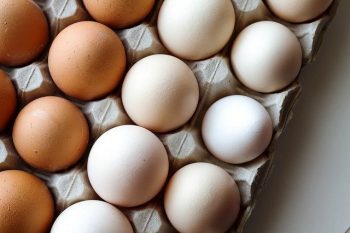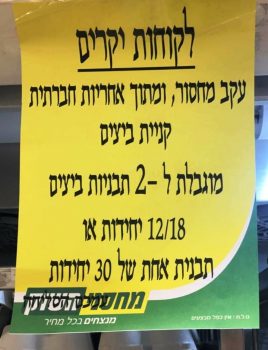Coronavirus in Israel: Eggs Shortage Posted by Ayana on May 1, 2020 in Uncategorized
Friday the 13th this past March was an odd day for Israelis.
The media reported upcoming plans to lockdown Israel. Times and details had not yet been announced, leaving the population of Israel uncertain about the future. The next day, on Saturday evening, prime minister Netanyahu announced shutting down all educational institutions, and halting all commercial activity. People had started to realize: יִשְׂרָאֵל בַּדֶּרֶךְ לְהֶסְגֵּר (Israel gets closer to be lockdown). And although it was the weekend, many stormed (הִסְתַּעְרוּ) the supermarkets.
Long queues (תּוֹרׅים) are not a common sight in Israel on Saturday evening. Shabbat, which starts on Friday and ends on Saturday, is a holy day in Judaism, a national day of rest in which most shopping centers are closed. On this weekend, though, supermarkets across the country were flooded with people. The panic buying (בֶּהָלַת הַקְּנִיּוֹת) that began a couple of days earlier, reached its peak that Saturday. We never do our shopping on Saturday evening, said one of the customers, we came here today because of the situation. He was one among many anxious shoppers who queued for hours to get prepared for the upcoming lockdown, leaving bare shelves behind.
The unusual huge panic buying forced the Director General of the Health Ministry to issue a special announcement that Saturday, reassuring the citizens that in all future plans of defense against the virus, supermarkets will remain open. There is no need to rush the supermarkets, added prime minister Netanyahu, there is enough food and supply (אַסְפָּקָה).
The mass hysteria broke sales records. The second week of March ended up with about 40% more sales than in the previous year. Total sales (מְכׅירוֺת) amounted to about a billion shekels more than in March last year. Despite the shutdown of hotels, restaurants, and event halls, food companies recorded double-digit growth in sales in the first quarter of 2020. The widespread panic (תַּבְהֵלָה, בֶּהָלָה) had people rushing to stock up online, too. The website of a major Israeli supermarket chain had crashed just a couple of days earlier.
Before getting locked down, Israelis stocked up on toilet paper, hand sanitizer, canned food, pasta, rice, frozen meat, oil, butter, cheese, and eggs. Netanyahu was right. The empty shelves of that Saturday evening, were filled with new products the next day. All but the eggs shelf. Normally Israelis buy 6 million eggs a day, all provided from local coops. A week of panicked overbuying and hoarding of eggs created a supply shortage (מַחְסוֹר). My friend, for example, fearing the unknown, bought 10 cartons on that Friday the 13th. Apparently she wasn’t the only one stock-pilling for what eventually became weeks of lockdown, including several days of full lockdown during Passover.
The stores respond quickly and began limiting (לְהַגְבִּיל) the amount of eggs a customer can buy. Supermarkets have begun rationing (לְהַקְצִיב) up to one or two egg cartons per buyer.
But rationing didn’t help. The local and global widespread of the coronavirus, and the tightening restrictions of lockdown as days passed by, caused people to buy every egg they were able to put their hands on. New eggs supplies arriving at supermarkets were sold in minutes. In some cases, crowds formed, violating (לְהָפֵר) social-distancing orders. In Rishon Letzion, a line grew to hundreds, forcing police to break up the crowds. In Jerusalem, a store sold eggs only for customers who spent at least 5o shekels on commodities in the store. In Modi’in Illit, people stole eggs off the backs of a delivery truck.
Supermarkets’ forlorn egg shelves remained empty (רֵיק) for weeks. Deliveries ordered online didn’t provide eggs, either. The Agriculture Ministry tried to meet the demand by stepped-up imports. Cargo ships and El Al flights carrying millions of eggs arrived in Israel during April, helping to alleviate the nationwide shortage.
Text vocabulary
Lockdown = הֶסְגֵּר
To storm = לְהִסְתַּעֵר
Queue = תּוֹר, לַעֲמוֺד בַּתּוֹר
Panic buying = בֶּהָלַת קְנִיּוֹת
Supply = אַסְפָּקָה
Sale = מְכִירָה,מִבְצָע
Panic = תַּבְהֵלָה, בֶּהָלָה
Shortage = מַחְסוֹר
To limit = לְהַגְבִּיל
To ration = לְהַקְצִיב
To violate = לְהָפֵר
Empty = רֵיק

Build vocabulary, practice pronunciation, and more with Transparent Language Online. Available anytime, anywhere, on any device.







Comments:
Yohai:
It is amazing that this was only a month and a half ago, is it not? For us, the ordeal began two weeks before, when isolation started to be required from people returning from abroad. We had flight tickets to Greece for March 6th, and only on March 5th did we decide not to show up for the flight, fearing that Greece will be added to the list of countries where a visit means two weeks in isolation. That was a good decision!
Ayana:
@Yohai Good decision, indeed. 4 days later Israel ordered two weeks isolation to all people entering Israel from abroad. Yohai, thank you so much for your comment! I hope international travel will be opened up soon, and you will have the chance to visit Greece.